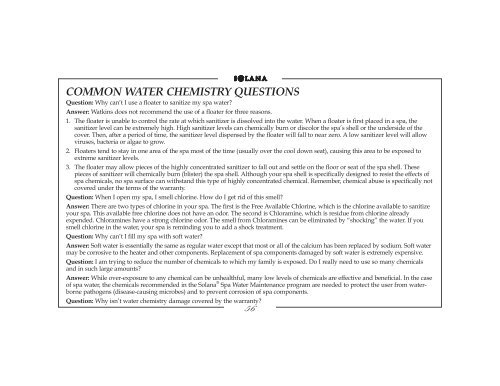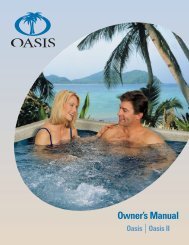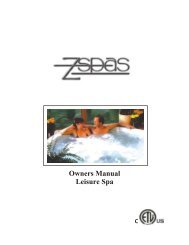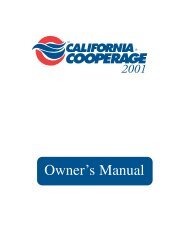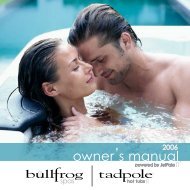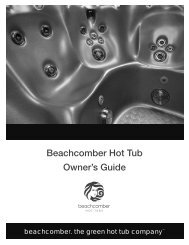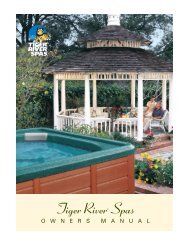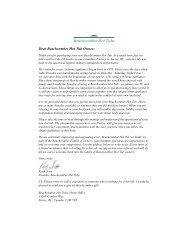owner’s manual
2005 - Coastal Hot Spring Spas
2005 - Coastal Hot Spring Spas
You also want an ePaper? Increase the reach of your titles
YUMPU automatically turns print PDFs into web optimized ePapers that Google loves.
COMMON WATER CHEMISTRY QUESTIONS<br />
Question: Why can’t I use a floater to sanitize my spa water?<br />
Answer: Watkins does not recommend the use of a floater for three reasons.<br />
1. The floater is unable to control the rate at which sanitizer is dissolved into the water. When a floater is first placed in a spa, the<br />
sanitizer level can be extremely high. High sanitizer levels can chemically burn or discolor the spa’s shell or the underside of the<br />
cover. Then, after a period of time, the sanitizer level dispensed by the floater will fall to near zero. A low sanitizer level will allow<br />
viruses, bacteria or algae to grow.<br />
2. Floaters tend to stay in one area of the spa most of the time (usually over the cool down seat), causing this area to be exposed to<br />
extreme sanitizer levels.<br />
3. The floater may allow pieces of the highly concentrated sanitizer to fall out and settle on the floor or seat of the spa shell. These<br />
pieces of sanitizer will chemically burn (blister) the spa shell. Although your spa shell is specifically designed to resist the effects of<br />
spa chemicals, no spa surface can withstand this type of highly concentrated chemical. Remember, chemical abuse is specifically not<br />
covered under the terms of the warranty.<br />
Question: When I open my spa, I smell chlorine. How do I get rid of this smell?<br />
Answer: There are two types of chlorine in your spa. The first is the Free Available Chlorine, which is the chlorine available to sanitize<br />
your spa. This available free chlorine does not have an odor. The second is Chloramine, which is residue from chlorine already<br />
expended. Chloramines have a strong chlorine odor. The smell from Chloramines can be eliminated by “shocking” the water. If you<br />
smell chlorine in the water, your spa is reminding you to add a shock treatment.<br />
Question: Why can’t I fill my spa with soft water?<br />
Answer: Soft water is essentially the same as regular water except that most or all of the calcium has been replaced by sodium. Soft water<br />
may be corrosive to the heater and other components. Replacement of spa components damaged by soft water is extremely expensive.<br />
Question: I am trying to reduce the number of chemicals to which my family is exposed. Do I really need to use so many chemicals<br />
and in such large amounts?<br />
Answer: While over-exposure to any chemical can be unhealthful, many low levels of chemicals are effective and beneficial. In the case<br />
of spa water, the chemicals recommended in the Solana ® Spa Water Maintenance program are needed to protect the user from waterborne<br />
pathogens (disease-causing microbes) and to prevent corrosion of spa components.<br />
56<br />
Question: Why isn’t water chemistry damage covered by the warranty?


